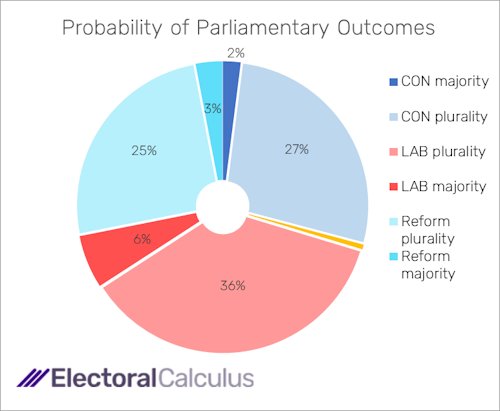At last July's election, Nigel Farage's party benefited Labour as it took eight times as many votes from the Conservatives as it did from Keir Starmer's party and the five seats it won all came from the Tories. This was consistent with Reform's right-wing image as an anti-EU, anti-immigration protest party. But that was then.
Now that Labour is in control of government it has become the victim of Reform's protest appeal. In the average of March opinion polls the two parties are nearly tied for first place with support for each just under 25 percent. Labour has gone down ten percentage points and Reform has gone up nine percent. These net figures combine bigger shifts among the six parties now competing for popular approval.

Labour is still forecast as likely to win the most seats in the House of Commons according MRP analysis, but its projected 189 MPs is less than half the total it now has and it is 137 seats short of a parliamentary majority. A breakdown of Labour losses shows that it would lose 121 seats to Reform candidates if an election were held today.
This is a big breakthrough for Nigel Farage's party, since more than one-third of projected gains are in constituencies where the party was in third place at the last general election, trailing Labour by up to 20 percentage points or more. It is consistent with the outlook in the forthcoming by-election in Runcorn, in which Reform lagged 34 percentage points behind Labour at the last election but polls now show Reform in the lead there.
Labour is losing seats on three fronts. Even though Conservative support is down by one percent from the general election, the fall in Labour support is so much greater that the Tories stand to gain 69 of its seats. This helps it to take a total of 183 seats, landing in second place and forty seats ahead of Reform. Concurrently, the Scottish National Party is projected to reclaim 33 seats it lost to Labour last July.
With the next general election more than four years away, the Labour government has lots of time to recover. On present poll figures, MRP analysis shows that there is a one in ten chance that Labour could gain a parliamentary majority of 331 seats. Neither Reform nor the Conservatives have even a long-shot chance of winning a majority of MPs. But there is also a one in ten chance that Labour could end up with less than one hundred MPs in the next House of Commons.
Given the unprecedented ground Labour has lost in the first nine months of this Parliament, the starting point for recovery is not last year's massive majority but its current weak plurality of 189 seats. Immediately, its prospects for April are doubtful when the impact of Rachel Reeve's unpopular late March budget cuts will be fully taken into account. In addition, the negative impact of President Donald Trump's proposed tariff war on foreign economies will add a challenge to a Labour recovery based on a notional plan for economic growth.
Prof Richard Rose of the University of Strathclyde Glasgow is Britain's senior psephologist.